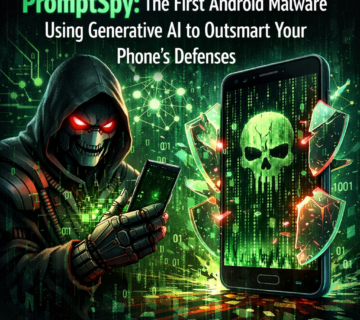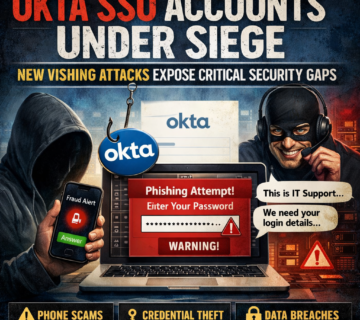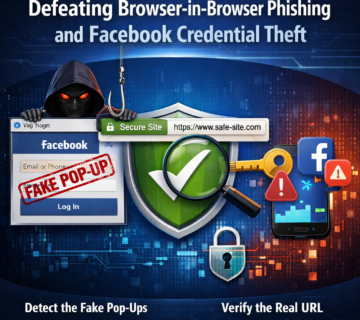Google Takes Legal Action Against Chinese Phishing Network Targeting American Consumers
🎙️ Dive Deeper with Our Podcast!
Google’s Lawsuit Against Lighthouse Phishing Network
The digital landscape has become increasingly treacherous for everyday Americans, with sophisticated cybercriminals operating elaborate schemes to steal personal and financial information. In a significant move to protect consumers, Google has initiated legal proceedings against a massive phishing operation that has victimized over one million people across the globe through deceptive text message campaigns.
The Lighthouse Platform: A Factory for Digital Deception
Technology giant Google filed a comprehensive lawsuit targeting “Lighthouse,” a sophisticated phishing-as-a-service platform that has enabled criminals worldwide to orchestrate large-scale fraud operations. This service operates as a turnkey solution for cybercriminals, providing ready-made phishing templates and technical infrastructure that allow bad actors to impersonate trusted organizations without requiring advanced technical skills.
The platform’s business model centers on subscription-based access, with pricing structures ranging from weekly to annual plans. This democratization of cybercrime tools has lowered the barrier to entry for fraudsters, creating a proliferation of attacks that have affected victims in 120 countries. The scale of the operation is staggering, with estimates suggesting that approximately 115 million payment cards in the United States alone may have been compromised between July 2023 and October 2024.
How These Text Message Scams Target Unsuspecting Victims
The criminal network behind Lighthouse has developed a particularly effective strategy that exploits common concerns about unpaid bills and outstanding charges. Their primary attack vector involves sending text messages that appear to originate from legitimate organizations such as the United States Postal Service and various toll road authorities like E-ZPass.
These fraudulent messages typically claim that recipients have outstanding toll charges or undelivered packages requiring immediate attention. The urgency embedded in these communications pressures people into clicking malicious links without carefully evaluating their legitimacy. Once victims access these fraudulent websites, they encounter convincing replicas of official payment portals that capture sensitive information including credit card numbers, personal identification details, and login credentials.
The sophistication of these operations extends beyond simple text messages. The platform enables attackers to send communications through both iMessage for Apple devices and RCS messaging for Android phones, potentially bypassing traditional spam filtering systems that protect consumers from fraudulent communications.
The Connection to Chinese Threat Actors
Cybersecurity researchers at Cisco Talos have traced the Lighthouse platform to a Chinese threat actor operating under the alias “Wang Duo Yu.” This individual has established communication channels on Telegram where they market and provide technical support for the phishing kits, effectively running a customer service operation for criminals.
The group behind Lighthouse previously operated under the name “Smishing Triad” before rebranding their operation in March 2025. This name change likely represents an attempt to evade law enforcement attention while continuing their fraudulent activities. Security researchers have documented the use of thousands of deliberately misspelled domain names designed to closely resemble legitimate websites, making it difficult for casual observers to distinguish authentic sites from fraudulent ones.
Similar operations attributed to other Chinese cybercriminal groups, including platforms named Darcula and Lucid, suggest a broader ecosystem of phishing-as-a-service providers operating from overseas locations. Security analysts have identified technical connections between Lighthouse and Lucid, indicating possible collaboration or shared resources among these criminal enterprises.
Google’s Trademark Exploitation Claims
A particularly concerning aspect of the Lighthouse operation involves the unauthorized use of Google’s brand identity to enhance the credibility of fraudulent websites. The lawsuit reveals that investigators discovered at least 107 phishing templates incorporating Google’s trademarks and branding elements on fake login screens.
This strategic misuse of trusted brand imagery serves a specific purpose in the criminal operation. When potential victims encounter websites featuring recognizable logos and design elements from companies like Google, they are more likely to perceive those sites as legitimate and trustworthy. This false sense of security encourages people to enter sensitive information that they would otherwise protect more carefully.
The legal action Google has initiated includes claims under several federal statutes, including the Racketeer Influenced and Corrupt Organizations Act, which addresses organized criminal enterprises, along with the Lanham Act covering trademark infringement and the Computer Fraud and Abuse Act targeting unauthorized computer access and fraud.
Geographic Spread of the Toll Road Scams
The criminal campaigns utilizing Lighthouse infrastructure have demonstrated remarkable geographic reach across the United States. Security researchers have documented fraudulent E-ZPass billing notifications targeting residents in Washington, Florida, Pennsylvania, Virginia, Texas, Ohio, Illinois, and Kansas. This widespread distribution suggests the operators are conducting systematic campaigns rather than opportunistic attacks.
The selection of toll road authorities as impersonation targets reflects strategic thinking by the criminals. Many Americans regularly use toll roads and electronic payment systems, making messages about outstanding charges seem plausible. Additionally, the fragmented nature of toll authorities across different states creates confusion about legitimate communication methods, making it easier for fraudulent messages to appear authentic.
Technology Solutions and Prevention Measures
In conjunction with announcing the lawsuit, Google revealed several technological initiatives aimed at protecting consumers from these sophisticated scam operations. The company is expanding its deployment of artificial intelligence systems designed to identify and filter fraudulent messages before they reach users. These AI-powered detection systems analyze patterns in messaging traffic to identify characteristics associated with phishing attempts.
Google Messages, the company’s messaging application, is receiving enhanced security protections specifically designed to combat smishing attacks. These improvements work in the background to evaluate incoming messages and warn users about potential threats. Additionally, Google has enhanced its account recovery features through a system called Recovery Contacts, which helps legitimate users regain access to their accounts while making it more difficult for criminals to hijack accounts.
Beyond technological solutions, Google emphasizes the importance of public education in combating these threats. The company plans to continue partnership programs with law enforcement agencies and consumer protection organizations to help people recognize warning signs of fraudulent communications.
Supporting Federal Policy Initiatives
Google’s legal action against Lighthouse coincides with the company’s endorsement of several legislative proposals aimed at strengthening consumer protections against fraud and international cybercrime operations. These policy initiatives address different aspects of the scam ecosystem that enables criminals to victimize Americans.
The Guarding Unprotected Aging Retirees from Deception Act would provide state and local law enforcement agencies with enhanced capabilities to investigate fraud schemes specifically targeting retired individuals, who often face heightened vulnerability to financial scams. The Foreign Robocall Elimination Act proposes establishing a dedicated task force focused on blocking illegal automated calls originating from overseas locations.
Perhaps most relevant to the Lighthouse case, the Scam Compound Accountability and Mobilization Act would create a comprehensive national strategy for countering scam operations and impose sanctions on individuals and organizations running these criminal enterprises. This legislative framework would provide law enforcement with additional tools to disrupt international cybercrime networks.
Frequently Asked Questions
What should I do if I receive a suspicious text message about unpaid tolls or delivery fees?
Never click links in unsolicited text messages claiming you owe money. Instead, navigate directly to the official website of the organization by typing the address into your browser or using a bookmark. Contact the organization through their official customer service channels to verify whether any legitimate charges exist on your account.
How can I identify a phishing text message?
Look for several warning signs including urgent language demanding immediate action, generic greetings instead of personalized information, suspicious sender numbers, and links to unfamiliar web addresses. Legitimate organizations typically don’t request sensitive financial information through text messages.
What information do criminals typically try to steal through these scams?
Phishing operations like Lighthouse target credit card numbers, security codes, billing addresses, login credentials, and personal identification information. Some sophisticated attacks also attempt to capture two-factor authentication codes to bypass security measures protecting online accounts.
Are iPhone and Android users equally vulnerable to these attacks?
Yes, the Lighthouse platform specifically supports sending fraudulent messages through both iMessage for Apple devices and RCS messaging for Android phones. Users of all mobile platforms should maintain vigilance when receiving unexpected messages requesting action or payment.
What should I do if I accidentally provided information to a phishing site?
Immediately contact your financial institutions to report the compromise and request new cards. Change passwords for any accounts that may have been affected. Consider placing fraud alerts on your credit reports with the major credit bureaus. Monitor your accounts closely for unauthorized activity.
Can these phishing sites steal information even if I don’t submit forms?
While most damage occurs when victims actively enter information, some malicious websites can attempt to exploit browser vulnerabilities or install tracking software. This makes it important to avoid visiting suspicious sites entirely rather than simply refraining from entering information.
How do criminals obtain phone numbers to target with these scams?
Cybercriminals acquire phone number databases through various means including data breaches, purchasing lists from other criminals, scraping publicly available information, and using automated systems to generate number combinations. This explains why people receive scam messages even when they haven’t signed up for services.
How Technijian Can Help
As these sophisticated phishing operations continue evolving, Orange County businesses need comprehensive cybersecurity strategies that protect both their organizations and employees from falling victim to these schemes. Technijian provides enterprise-level security solutions specifically designed to defend against the types of threats posed by platforms like Lighthouse.
Our managed IT services include advanced email and messaging security systems that filter fraudulent communications before they reach your team members. We implement multi-layered authentication protocols that make it significantly more difficult for criminals to compromise accounts even if credentials are stolen. Our security awareness training programs educate your staff about recognizing phishing attempts and responding appropriately to suspicious communications.
Technijian’s cybersecurity experts monitor the latest threat intelligence to ensure your defenses stay current with emerging attack techniques. We provide 24/7 security monitoring that identifies unusual activity patterns indicating potential compromises, allowing for rapid response that minimizes damage. Our backup and disaster recovery solutions ensure your business can maintain operations even if attacked by cybercriminals.
Don’t wait until your organization becomes another statistic in the next major phishing campaign. Contact Technijian today to schedule a comprehensive security assessment for your Southern California business. Our team will evaluate your current vulnerabilities and design a customized protection strategy that keeps your data, finances, and reputation secure against evolving cyber threats.
About Technijian
Technijian is a premier Managed IT Services provider in Irvine, specializing in delivering secure, scalable, and innovative AI and technology solutions across Orange County and Southern California. Founded in 2000 by Ravi Jain, what started as a one-man IT shop has evolved into a trusted technology partner with teams of engineers, AI specialists, and cybersecurity professionals both in the U.S. and internationally.
Headquartered in Irvine, we provide comprehensive cybersecurity solutions, IT support, AI implementation services, and cloud services throughout Orange County—from Aliso Viejo, Anaheim, Costa Mesa, and Fountain Valley to Newport Beach, Santa Ana, Tustin, and beyond. Our extensive experience with enterprise security deployments, combined with our deep understanding of local business needs, makes us the ideal partner for organizations seeking to implement security solutions that provide real protection.
We work closely with clients across diverse industries, including healthcare, finance, law, retail, and professional services, to design security strategies that reduce risk, enhance productivity, and maintain the highest protection standards. Our Irvine-based office remains our primary hub, delivering the personalized service and responsive support that businesses across Orange County have relied on for over two decades.
With expertise spanning cybersecurity, managed IT services, AI implementation, consulting, and cloud solutions, Technijian has become the go-to partner for small to medium businesses seeking reliable technology infrastructure and comprehensive security capabilities. Whether you need Cisco Umbrella deployment in Irvine, DNS security implementation in Santa Ana, or phishing prevention consulting in Anaheim, we deliver technology solutions that align with your business goals and security requirements.
Partner with Technijian and experience the difference of a local IT company that combines global security expertise with community-driven service. Our mission is to help businesses across Irvine, Orange County, and Southern California harness the power of advanced cybersecurity to stay protected, efficient, and competitive in today’s threat-filled digital world.





